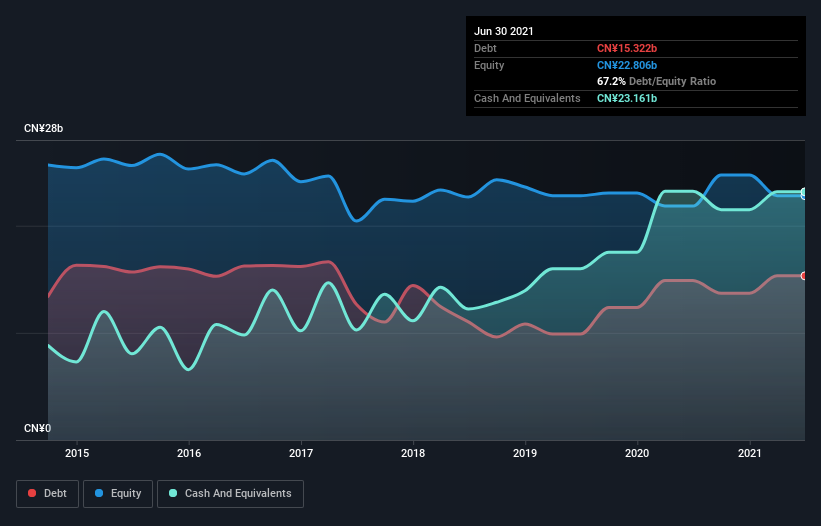These 4 Measures Indicate That Tingyi (Cayman Islands) Holding (HKG:322) Is Using Debt Reasonably Well
David Iben put it well when he said, 'Volatility is not a risk we care about. What we care about is avoiding the permanent loss of capital.' When we think about how risky a company is, we always like to look at its use of debt, since debt overload can lead to ruin. As with many other companies Tingyi (Cayman Islands) Holding Corp. (HKG:322) makes use of debt. But should shareholders be worried about its use of debt?
Why Does Debt Bring Risk?
Debt is a tool to help businesses grow, but if a business is incapable of paying off its lenders, then it exists at their mercy. If things get really bad, the lenders can take control of the business. However, a more usual (but still expensive) situation is where a company must dilute shareholders at a cheap share price simply to get debt under control. Of course, the upside of debt is that it often represents cheap capital, especially when it replaces dilution in a company with the ability to reinvest at high rates of return. When we examine debt levels, we first consider both cash and debt levels, together.
Check out our latest analysis for Tingyi (Cayman Islands) Holding
How Much Debt Does Tingyi (Cayman Islands) Holding Carry?
The chart below, which you can click on for greater detail, shows that Tingyi (Cayman Islands) Holding had CN¥15.3b in debt in June 2021; about the same as the year before. However, it does have CN¥23.2b in cash offsetting this, leading to net cash of CN¥7.84b.

How Strong Is Tingyi (Cayman Islands) Holding's Balance Sheet?
According to the last reported balance sheet, Tingyi (Cayman Islands) Holding had liabilities of CN¥32.8b due within 12 months, and liabilities of CN¥10.7b due beyond 12 months. On the other hand, it had cash of CN¥23.2b and CN¥2.14b worth of receivables due within a year. So it has liabilities totalling CN¥18.1b more than its cash and near-term receivables, combined.
While this might seem like a lot, it is not so bad since Tingyi (Cayman Islands) Holding has a market capitalization of CN¥64.3b, and so it could probably strengthen its balance sheet by raising capital if it needed to. But we definitely want to keep our eyes open to indications that its debt is bringing too much risk. Despite its noteworthy liabilities, Tingyi (Cayman Islands) Holding boasts net cash, so it's fair to say it does not have a heavy debt load!
On the other hand, Tingyi (Cayman Islands) Holding saw its EBIT drop by 6.7% in the last twelve months. If earnings continue to decline at that rate the company may have increasing difficulty managing its debt load. When analysing debt levels, the balance sheet is the obvious place to start. But ultimately the future profitability of the business will decide if Tingyi (Cayman Islands) Holding can strengthen its balance sheet over time. So if you want to see what the professionals think, you might find this free report on analyst profit forecasts to be interesting.
Finally, while the tax-man may adore accounting profits, lenders only accept cold hard cash. While Tingyi (Cayman Islands) Holding has net cash on its balance sheet, it's still worth taking a look at its ability to convert earnings before interest and tax (EBIT) to free cash flow, to help us understand how quickly it is building (or eroding) that cash balance. Over the last three years, Tingyi (Cayman Islands) Holding actually produced more free cash flow than EBIT. That sort of strong cash generation warms our hearts like a puppy in a bumblebee suit.
Summing up
While Tingyi (Cayman Islands) Holding does have more liabilities than liquid assets, it also has net cash of CN¥7.84b. The cherry on top was that in converted 143% of that EBIT to free cash flow, bringing in CN¥6.4b. So we don't have any problem with Tingyi (Cayman Islands) Holding's use of debt. There's no doubt that we learn most about debt from the balance sheet. However, not all investment risk resides within the balance sheet - far from it. For instance, we've identified 2 warning signs for Tingyi (Cayman Islands) Holding that you should be aware of.
At the end of the day, it's often better to focus on companies that are free from net debt. You can access our special list of such companies (all with a track record of profit growth). It's free.
If you're looking for stocks to buy, use the lowest-cost* platform that is rated #1 Overall by Barron’s, Interactive Brokers. Trade stocks, options, futures, forex, bonds and funds on 135 markets, all from a single integrated account. Promoted
Valuation is complex, but we're here to simplify it.
Discover if Tingyi (Cayman Islands) Holding might be undervalued or overvalued with our detailed analysis, featuring fair value estimates, potential risks, dividends, insider trades, and its financial condition.
Access Free AnalysisThis article by Simply Wall St is general in nature. We provide commentary based on historical data and analyst forecasts only using an unbiased methodology and our articles are not intended to be financial advice. It does not constitute a recommendation to buy or sell any stock, and does not take account of your objectives, or your financial situation. We aim to bring you long-term focused analysis driven by fundamental data. Note that our analysis may not factor in the latest price-sensitive company announcements or qualitative material. Simply Wall St has no position in any stocks mentioned.
*Interactive Brokers Rated Lowest Cost Broker by StockBrokers.com Annual Online Review 2020
Have feedback on this article? Concerned about the content? Get in touch with us directly. Alternatively, email editorial-team (at) simplywallst.com.
About SEHK:322
Tingyi (Cayman Islands) Holding
An investment holding company, manufactures and sells instant noodles, beverages, and instant food products in the People’s Republic of China.
Proven track record with adequate balance sheet and pays a dividend.
Similar Companies
Market Insights
Community Narratives




